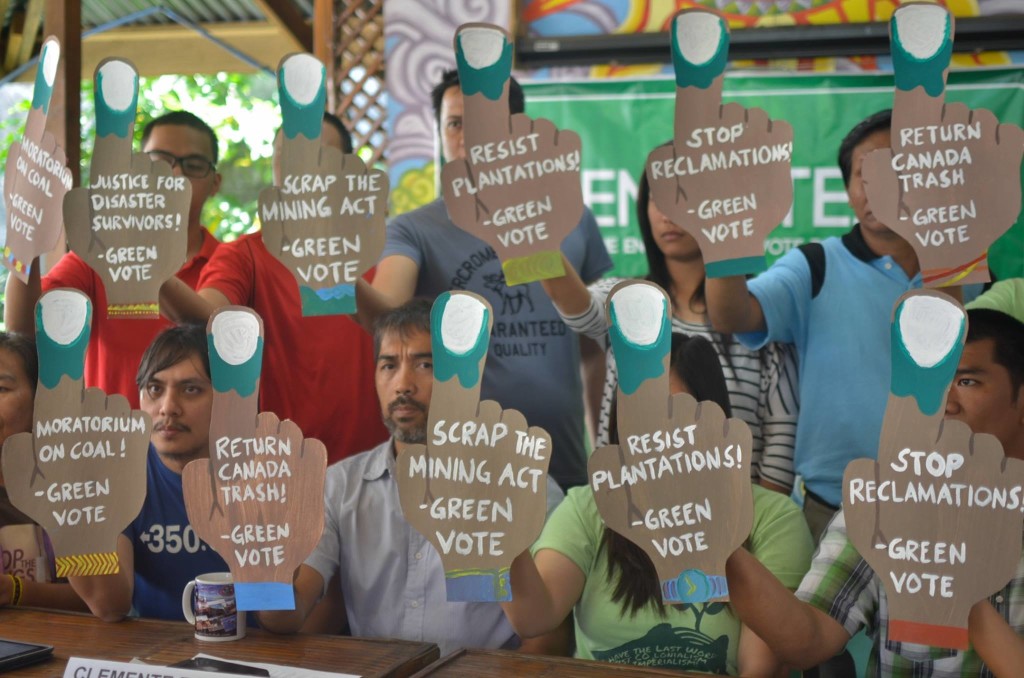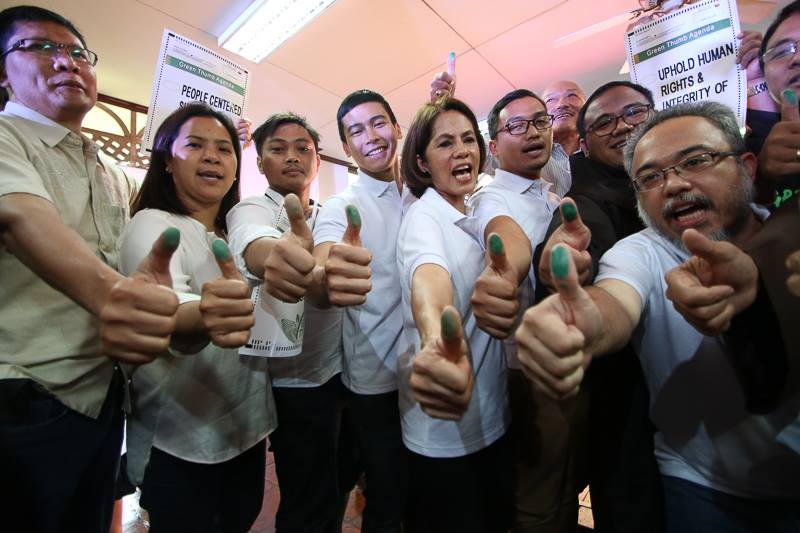By Chuck Baclagon
The Philippines’ raucous democracy cranks into top gear as the three-month campaign season starts with most interest on a crowded contest to succeed Benigno Aquino III, as the president of the republic, with familiar themes of corruption, dictatorship and personality politics to dominate the current public discourse.
In the midst of the election circus advocates in the broader environmental justice movement here are seizing the power to utilize the season in achieving milestones for their respective campaigns.
Green Vote 2016
Environmental advocates including Kalikasan People’s Network for the Environment, Center for Environmental Concerns and others have come together in a broad voter education campaign, the ‘Green Vote 2016’, to help voters choose ‘eco-friendly’ candidates in the upcoming national elections. The campaign aims to scrutinize track records and platforms of election candidates by conducting a background research on the track records and a survey on among the national candidates running for the presidential, vice-presidential, and senatorial positions.
The groups raised 10 major environmental concerns that they will challenge candidates to take on as their platforms: (1) Big mining, (2) Large-scale logging, (3) solid waste and air pollution, (4) Free trade and transboundary waste, (5) GMO crops, (6) land-use conversion such as reclamation projects and plantations, (7) climate change and extreme weather events, (8) coal and other destructive energy, (9) rights of environmental defenders, and (10) corruption in environmental governance.
According to the convenors of the network, these are flashpoint issues, that have aggravated the degraded state of the Philippine environment over the past five years.
Green Thumb
Over 40 national and local organizations including the Philippine Movement for Climate Justice, Alyansa Tigil Mina, Greenpeace Philippines, Ecowaste Coalition, Global Alliance for Incinerator Alternatives, Bantay Kalikasan, Ecological Justice Interfaith Movement among others launched the Green Thumb Coalition and challenged 2016 presidential candidates to put socio-environmental issues at the heart of their electoral platforms.
The coalition, made up primarily of environmental groups and frontline communities and with the combined support of 10 million, came together to raise awareness on naturally interrelated environmental issues that are connected to social matters like poverty and corruption. The coalition aims to get the commitment of national and local candidates to embrace a green agenda, and hold newly elected public officials accountable on their positions and commitments to their environmental mandates.
With the 2016 elections coming up, the Green Thumb Coalition will engage with political aspirants and the voting public by raising the debate on nine (9) key environmental issues at the national level. These include: 1) biodiversity and ecosystem integrity; 2) natural resource and land use management and governance; 3) human rights and integrity of creation; 4) climate justice; 5) mining, extractives and mineral resource management; 6) energy transformation and democracy; 7) sustainable food sovereignty; 8) people-centered sustainable development; and 9) waste.
The Green Thumb Coalition will soon hold a series of forums nationwide leading up to the May elections to raise awareness among the voting public to choose the right leaders who will champion the environment and share plans for a greener economy. The Coalition is scheduled to be in the provinces of Batangas, Palawan, Zambales, Sorsogon, Mindoro, Tuguegarao, Antique, Iloilo, Guimaras, Samar, Leyte, Cebu, SOCSARGEN, Davao, Zamboanga and CARAGA to formally introduce the group’s green electoral campaign to the local communities.
Advancing our struggle in the ballot box
“The hard proof that a country is taking action on climate change is its energy policy.” – Lidy Nacpil
Unfortunately for the Philippine government the hard proof shows otherwise.
Even if we have a renewable energy law and In spite of us being hailed as a leader in climate action with our 70% Intended Nationally Determined Contribution and our progressive positions in the Climate Vulnerable Forum, our energy policy falls short on the seriousness of our action.
To date there are: 26 existing coal fired power plants and in this administration alone there are at least 59 in the pipeline for new builds and expansion projects for existing plants.
Our goal is for an informed electorate that votes for candidates that have a proven track record of standing up for the interest of the people and the planet.
Candidates who are not afraid of going against the grain of a coal-powered development model that inflicts harm of the health of communities, our ecosystems and adds more carbon dioxide to our atmosphere.
Our failure as a country to take decisive action on climate change sends a message that legitimizes the current inaction of big historical and per capita emitter countries.
A proportional response to the climate crisis requires nothing less than the profound transformation of how we use, produce and distribute ‘power’ not only in the energy sector but also in the political arena.
That’s why we need to push our candidates who have a platform on two things:
- A moratorium on new projects and expansions
- A just transition from coal to renewable energy
The struggle for a sustainable and just future calls for the deployment of a multiplicity of tactics that includes winning the ballot. Voting is one of the few political exercises that we have to live out our values and aspirations.
We need to seize this opportunity.
Ultimately every political action we take is a step closer to bringing us to a future that is not only sustainable but more importantly towards the realization of a just and peaceful society.


